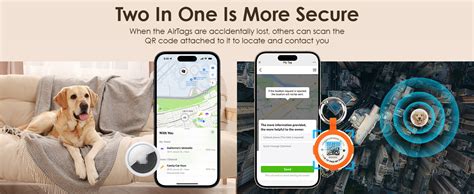Introduction
Pet owners are increasingly using technology to keep track of their furry friends. AirTags and QR codes are two popular options, but which one is best? In this article, we’ll compare the two technologies and help you decide which one is right for you. To start with, we first need to know the basic usage of them.

What is an AirTag?
An AirTag is a small, coin-shaped device that you can attach to your pet’s collar. It uses Bluetooth technology to connect to your iPhone, and you can use the Find My app to track your pet’s location.
What is a QR Code?
A QR code is a two-dimensional barcode that can be scanned by a smartphone. You can create a QR code that contains your pet’s information, such as their name, contact information, and medical records. If your pet gets lost, someone can scan the QR code to get your contact information and return your pet to you.
Comparison of AirTags and QR Codes
| Feature | AirTag | QR Code |
|---|---|---|
| Tracking technology | Bluetooth | QR code |
| Range | Up to 100 meters (328 feet) | Unlimited |
| Requires a smartphone | Yes | No |
| Requires an app | Yes | No |
| Subscription fee | No | No |
| Cost | $29 | Free |
AirTags: Pros and Cons
Pros:
- Easy to use
- Accurate tracking
- Long battery life
- Water-resistant
Cons:
- Requires a smartphone
- Requires an app
- Limited range
QR Codes: Pros and Cons
Pros:
- Free
- Easy to create
- Unlimited range
- No app required
Cons:
- Not as accurate as AirTags
- Requires a smartphone to scan
- Can be difficult to read if damaged
Which One is Right for You?
The best way to decide which technology is right for you is to consider your individual needs. If you want a tracking device that is accurate, easy to use, and has a long battery life, then an AirTag is a good option. If you want a free, easy-to-create tracking device that has an unlimited range, then a QR code is a good option.
Conclusion
AirTags and QR codes are both effective ways to track your pet. The best way to decide which technology is right for you is to consider your individual needs.
Additional Considerations
In addition to the factors listed above, you may also want to consider the following when choosing a pet tracking device:
- Size and weight: AirTags are small and lightweight, making them easy to attach to your pet’s collar. QR codes can be printed on a variety of materials, but they can be larger and heavier than AirTags.
- Durability: AirTags are water-resistant and can withstand some abuse. QR codes can be easily damaged, so you may want to laminate them or use a protective cover.
- Cost: AirTags cost $29 each, while QR codes are free to create.
- Compatibility: AirTags only work with Apple devices. QR codes can be scanned by any smartphone.
Market Insights
The market for pet tracking devices is growing rapidly. In 2022, the market was valued at $2.0 billion. It is projected to grow to $4.5 billion by 2025. This growth is being driven by the increasing number of pet owners and the growing popularity of technology.
Case Study: Finding a Lost Pet
In 2020, a pet owner named Sarah lost her dog, Buddy. She had an AirTag attached to his collar, so she was able to track his location using the Find My app. She was able to find Buddy within hours and bring him home safely.
Common Mistakes to Avoid
When using a pet tracking device, there are a few common mistakes to avoid:
- Not attaching the device securely: The device should be securely attached to your pet’s collar so that it doesn’t fall off.
- Not replacing the battery regularly: The battery in an AirTag should be replaced every year. The battery in a QR code does not need to be replaced.
- Not updating the information on the QR code: If your pet’s contact information changes, you should update the information on the QR code.
Effective Strategies for Using Pet Tracking Devices
There are a few effective strategies for using pet tracking devices to keep your furry friend safe:
- Use a tracking device that is right for your needs: Consider the factors listed above when choosing a tracking device.
- Attach the device securely to your pet’s collar: Make sure the device is attached securely so that it doesn’t fall off.
- Replace the battery regularly: Replace the battery in an AirTag every year. The battery in a QR code does not need to be replaced.
- Update the information on the QR code: If your pet’s contact information changes, update the information on the QR code.
- Monitor your pet’s location regularly: Use the Find My app to monitor your pet’s location regularly. If your pet gets lost, you can quickly track their location and bring them home safely.





















